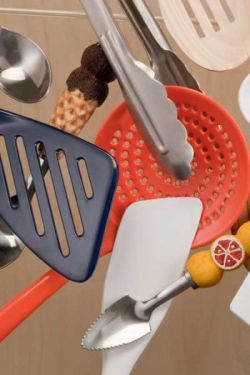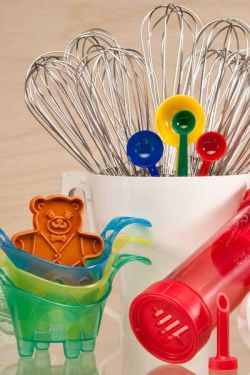

Materials
ABS (Acrylonitrile butadiene styrene) is a very strong and rigid plastic. It is popular for its toughness and resistance to impact. Although considerably more expensive than polystyrene, ABS has superior hardness, toughness and gloss. It is dishwasher safe. BPA free.
Melamine is a thermoset plastic, which means that it cannot be melted and reshaped after it has been molded once. It is this special characteristic which makes melamine more expensive and more desirable for upscale plastic housewares. It is dishwasher safe and BPA free. It is not for use in the microwave.
Hutzler’s melamine products are manufactured using labor-intensive methods which improve their characteristics. First, our melamine material, which begins in a powdered form, is weighed by hand. Then it is inserted into a compression mold where it stays for approximately 2 minutes. When it is removed, all of the flash (extra material) must be filed off. The flash is waste, but an intended result of overfilling the mold in order to always get a perfect part. Then, each piece is hand-polished using a special compound which gives our product its clean, shiny, and smooth appearance.
Unfortunately, all melamine is not created equally. Some manufacturers use injection molding which requires a lesser grade of melamine that often shows flow marks. Automatic pelletizing saves time and money, but does not permit uniform hardening of each piece, thus making it more brittle and apt to break. Hutzler Melamine meets all FDA standards for food safety. This means that it is perfectly safe to use with food. (This does not mean that it is food. Never eat your melamine.)
Nylon (PA) is a class of plastics that can be formed into fibers, sheets or bristles. It is widely used for housewares because of its strength and high heat resistance. It is dishwasher safe and BPA free.
Polyethylene (PE) is another widely used plastic. It is well known for use as a plastic shopping bag. It is somewhat flexible and ideal for lids. It is less heat resistant than polypropylene. It is not recommended for use in the dishwasher as it can warp. It is BPA free.
Polypropylene (PP) is a rugged and somewhat rigid plastic that is highly heat resistant. It is ideal for many housewares because for these reasons. It may be used in the microwave. It is dishwasher safe. BPA free.
Polyresin is a resin compound that is typically used for decorative statues and figurines. It is a strong but light material that can be molded with intricate detail. It also can be used with a wide variety of finishes, which makes it so great for decorative uses. It is not dishwasher safe.
Polystyrene (PS) is one of the most widely used kinds of plastic. It is ideal for molding or extrusion. It can be transparent or colored. It is not dishwasher safe. It is BPA free.
Stainless Steel is a steel alloy that does not stain, corrode, or rust as easily as ordinary steel. Although it is highly stain-resistant, it is not completely “stainless”. Stainless steel is ideal for use in the kitchen because it is extremely hygienic for preparation of foods, as its surface lacks pores or cracks that could harbor bacteria. And, because it does not react with acidic foods, it does not affect a food’s flavor. Stainless steel is also very easy to clean.
There are over 150 classes of stainless steel, with some more common than others.
18/10 Stainless (also commonly referred to as 316 stainless) refers to a makeup of 18% chromium and 10% nickel. Basically, the higher the nickel content, the more expensive the stainless. And, the more corrosion-resistant it is.
Silicone is a synthetic compound that is typically heat-resistant and rubbery. It is becoming very popular for use in kitchen products. It is dishwasher safe and BPA free.
Tin (Sn) is a chemical element that is not easily oxidized. For this reason, it is commonly used to coat other metals, such as steel, to prevent corrosion. Tin-plated steel is often used for food packaging, like the tin can.